- What do you need to do on the mention date?
- What happens during a court mention?
- What happens if the Defendant is absent but was served?
- What happens if the Plaintiff does not appear in Court and without sufficient excuse?
- What happens after the Defendant has filed and served his Defence?
- What happens after replies have been filed?
- Can plaintiff and defendant negotiate even after trial dates have been fixed?
- What happens if parties are unable to reach settlement prior to trial?

1) What do you need to do on the mention date?
You are required to be at the court building at least 10 minutes prior to the mention date. This will give you sufficient time to locate the court room where your case will be heard. You may seek assistance from the court's staffs to locate your court room.
You are reminded as follow:
- To dress appropriately;
- To bring your summons and relevant documents; and
- To silent your phone before entering the court room.
2) What happens during a court mention?
The court's interpreter will call each case in turn. Once your case has been called, you are to proceed to the front of the courtroom and bring all your documents with you, if any.
If you are the Plaintiff, you may apply as follow:
- If the Defendant admits to your claim, apply for consent judgment and cost;
- If the Defendant has not been served, apply for substituted service by leaving or by advertisement; or
- If the Defendant has been served (either personally or by substituted service) but failed to appear in court, apply for a new date to file in 'entry of judgment' (link to download 'notice). At the next mention date, you may apply for Judgment in Default and cost against the Defendant.
If the Defendant has signed a letter of undertaking (an agreement between the Plaintiff and the Defendant for the Defendant to pay for the Claim), apply for consent judgment in accordance with the letter of undertaking with cost.
If you are the Defendant, you may:
- Admit to the claim – consent judgment and cost will be entered against you;
- Admit to part of the claim and dispute to the remainder – consent judgment and cost will be entered against you for the sum that you admitted to. The court will then direct you to enter your Defence within 14 days for the disputed claim; or
- Dispute to the claim – the court will direct for you to enter your Defence within 14 days.
3) What happens if the Defendant is absent but was served?
Plaintiff may apply for Judgment in Default and cost provided that 'Notice of Entry of Application' is filed with the Court. If the Plaintiff has not filed in the Notice, a new date will be given to give the Plaintiff time to file. Plaintiff may then apply for Judgment in Default at the next mention date.
4) What happens if the Plaintiff does not appear in Court and without sufficient excuse?
The Court may strike out the claim against the Defendant, unless the Court sees good reason to the contrary.
5) What happens after the Defendant has filed and served his Defence?
After the Defendant has filed in his / her Defence with the court and served a copy to the Plaintiff, the Plaintiff may request for time to file in a reply. A reply is the Plaintiff's statement addressing the allegations made by the Defendant.
If the Defendant has filed in a Defence and counterclaim, then the Plaintiff must file in a reply to the Defence and file a Defence to a counterclaim. Failure to file in a Defence to the counterclaim then the Defendant may apply for Judgment in Default of Defence for the counterclaim against the Plaintiff.
If the Plaintiff has filed in his Defence to the counter-claim, the Defendant may file in reply to the Defence.
6) What happens after a Reply has been filed?
When a Reply to Defence or Counterclaim has been filed, then the pleadings are considered to be closed. The court will then set a date for pre-trial conference. At the pre-trial conference, the Magistrate may ask the following questions:
- Whether parties are agreeable for mediation ;
- Whether parties agree to certain facts and whether the issues of the case can be narrowed down;
- Whether parties are negotiating / whether there are offers for settlement;
- Number of witnesses and expert witnesses (if any);
- Whether parties are waiting for any reports or documents;
- When parties can exchange the list of documents;
- When parties can exchange their affidavits;
- When parties can exchange their bundle of documents and bundle of authorities;
- Setting trial dates.
7) Can plaintiff and defendant negotiate even after trial dates have been fixed?
Plaintiff and Defendant are encouraged to negotiate to avoid incurring further cost during trial.
8) What happens if parties are unable to reach settlement prior to trial?
The matter will then proceed for trial.

